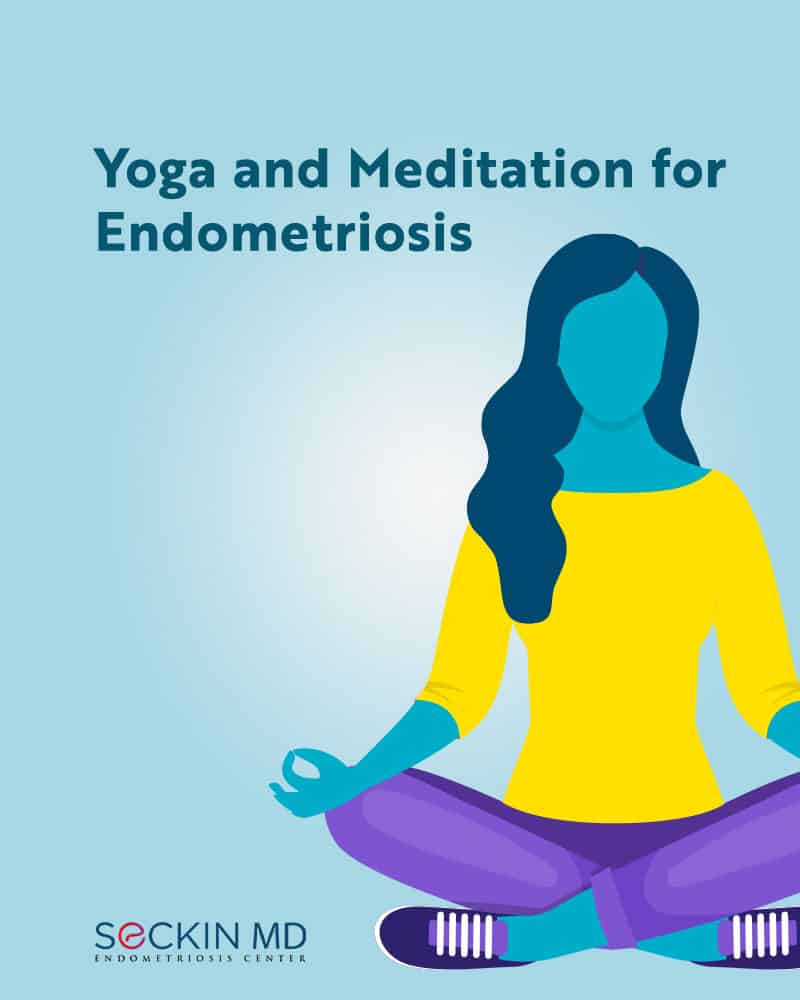Yoga and Meditation for Endometriosis

Endometriosis can be debilitating and often have an impact on the psychological and social functioning of patients. At times, it can even lead to anxiety and depression. Yoga and meditation can help cope with the symptoms of endometriosis and improve patients’ overall quality of life.
Endometriosis and stress
Studies have shown that endometriosis results in a reduced quality of life, increased stress perception, and depression. This is associated with a high production of cytokines leading to inflammation. Lower progesterone levels, which is a characteristic of endometriosis also influence stress hormone levels. This further promotes an inflammatory response in peritoneal lymphocytes (white blood cells).
Endometriosis has a high likelihood of misdiagnosis, thus the diagnosis process itself is a major contributor to stress. The best way to diagnose (and treat endometriosis) is via laparoscopic excision surgery where the sample is removed and sent to a histology laboratory for analysis.
Yoga and endometriosis
Yoga, more specifically Hatha Yoga, is an ancient Indian system that promotes overall physical and mental well-being, strength, and flexibility via a series of postures and breathing exercises called asanas. The World Health Organization (WHO) considers yoga as an integrative and complementary health practice. Yoga includes both meditative and physical aspects. Research has shown that yoga could help manage pain, particularly lower back pain.
Some endometriosis-friendly yoga poses that can help ease chronic pain include Vajrasana (thunderbolt pose), Malasana (squat), Janu Sirasaana (forward bend pose), and Svadhisthana (sacral chakra) combined with breathing exercises such as three-part breath and pause breath.
There have been few studies demonstrating the efficacy of yoga for endometriosis symptoms. A Brazilian qualitative study conducted alongside a randomized clinical trial evaluated the effect of yoga on symptoms of endometriosis. The results indicated that participants found yoga to be beneficial in controlling pelvic pain and in overall pain management. The Pranayama (breathing) techniques can be useful in making the women self-aware and increasing their ability to introspect. This, in turn, can help in pain relief. The study also showed that women with endometriosis who had undergone the eight-week yoga course had better self-control and self-awareness with reduced use of pain and psychiatric medications.
Another Brazilian study compared endometriosis symptoms such as chronic pelvic pain, menstrual patterns, and quality of life among two groups of women who underwent and did not undergo an eight-week yoga course. The results indicated that women who practiced yoga had a reduction in levels of chronic pelvic pain and an improvement in overall quality of life.
Meditation and endometriosis
Meditation is a means for relaxing the mind and body, increasing calmness, improving psychological balance, and overall quality of life. It involves selecting a distraction-free space, maintaining a comfortable posture, and trying to focus on a specific object, experience, and breathing pattern. Though studies so far have shown mixed results for meditation, the positive ones do demonstrate better control over pain.
A form of meditation that can be a complementary therapy in clinical settings is mindfulness-based stress reduction (MBSR). Mindfulness involves paying attention to things in a non-judgmental manner. Research has shown that mindfulness can reduce stress, boost working memory, increase focus, lower emotional reactions, improve cognition, and enhance self-awareness.
There aren’t many studies on the effect of meditation and mindfulness on endometriosis. However, a Danish study has shown that mindfulness can have lasting effects on pain levels. It can also improve daily functions and overall well-being. Another study indicated that techniques such as mindfulness, cognitive-behavioral therapy, and yoga can reduce endometriosis-associated pain and stress.
Laparoscopic surgery for complete alleviation of endometriosis symptoms
Yoga and meditation can help women with endometriosis better cope with symptoms of pain and possible depression and anxiety arising from it. However, they cannot treat endometriosis. The symptoms of the disease recur during each monthly cycle making it difficult to cope with daily activities. Laparoscopic excision surgery is the only “gold standard” treatment option that can fully remove endometrial lesions and provide lasting relief.
Surgeons at the Seckin Endometriosis Center are highly skilled and possess the ability and experience to remove even the most hard-to-reach endometrial lesions.
Do you practice yoga and meditation? Please share your experience and comment on our post on Facebook or Instagram.
Get a Second Opinion
Our endometriosis specialists are dedicated to providing patients with expert care. Whether you have been diagnosed or are looking to find a doctor, they are ready to help.Our office is located on 872 Fifth Avenue New York, NY 10065.
You may call us at (646) 960-3080 or have your case reviewed by clicking here.